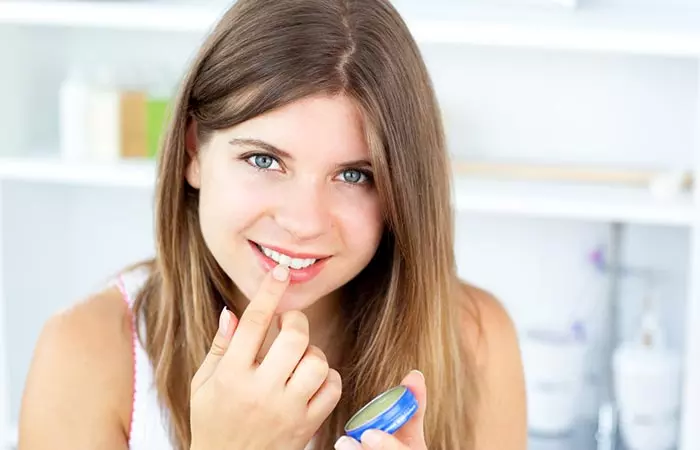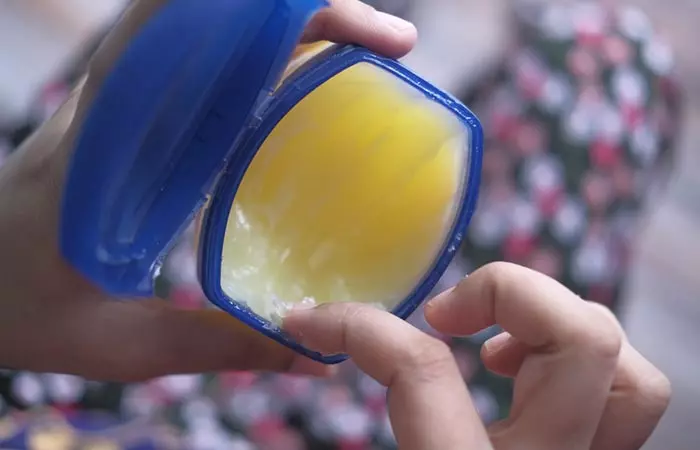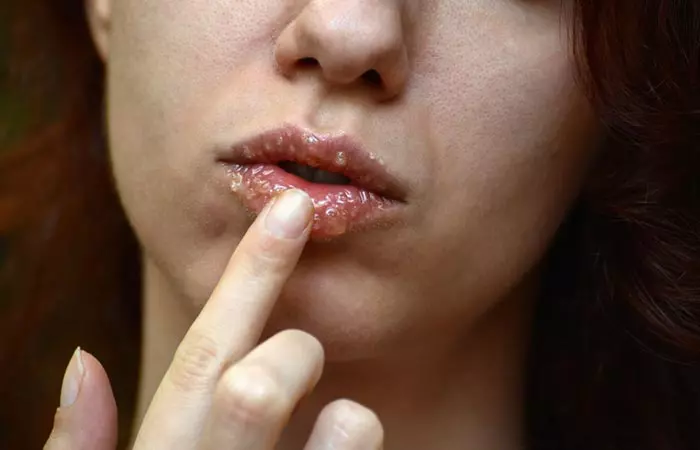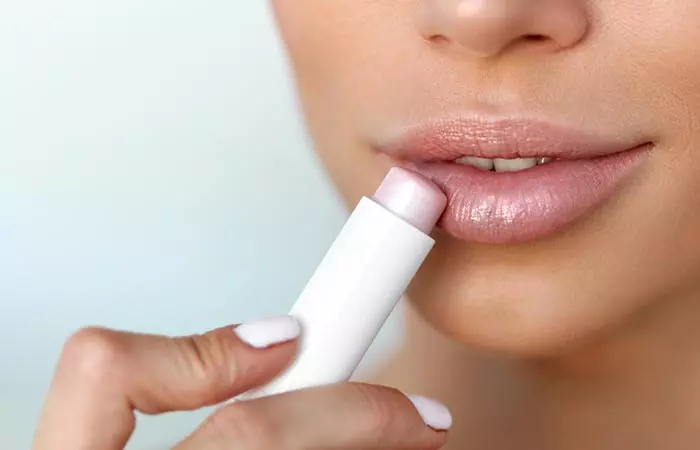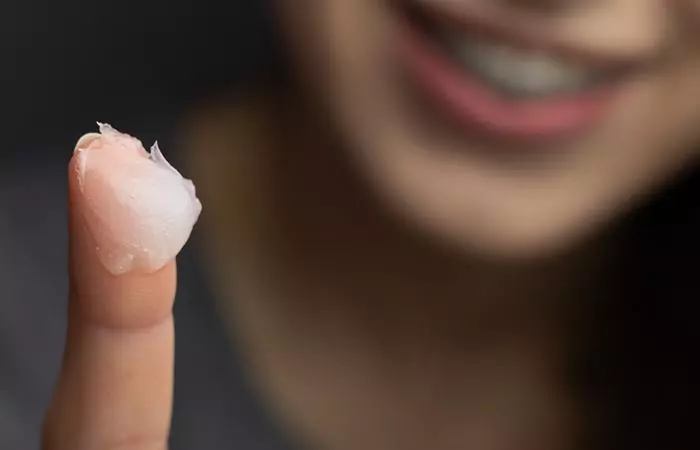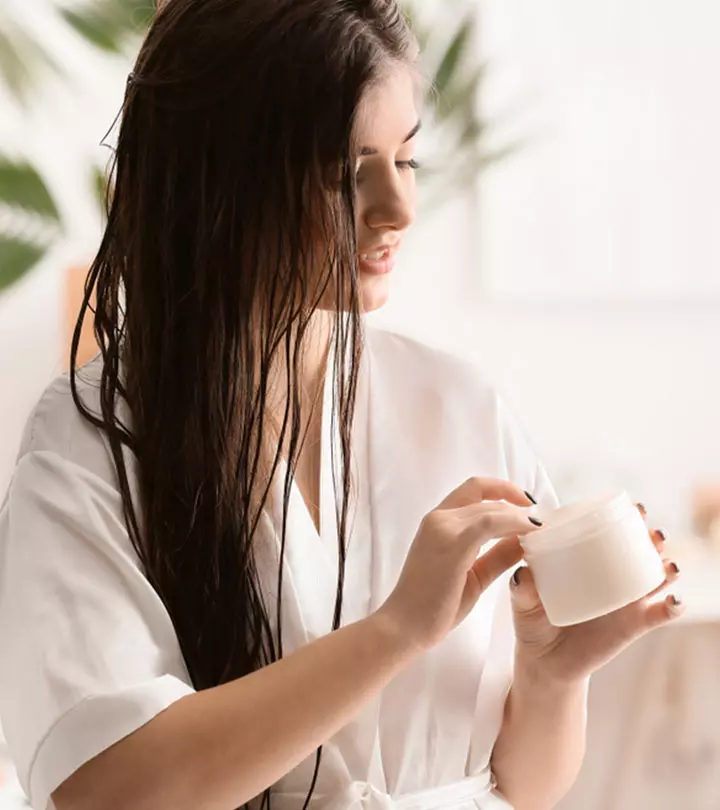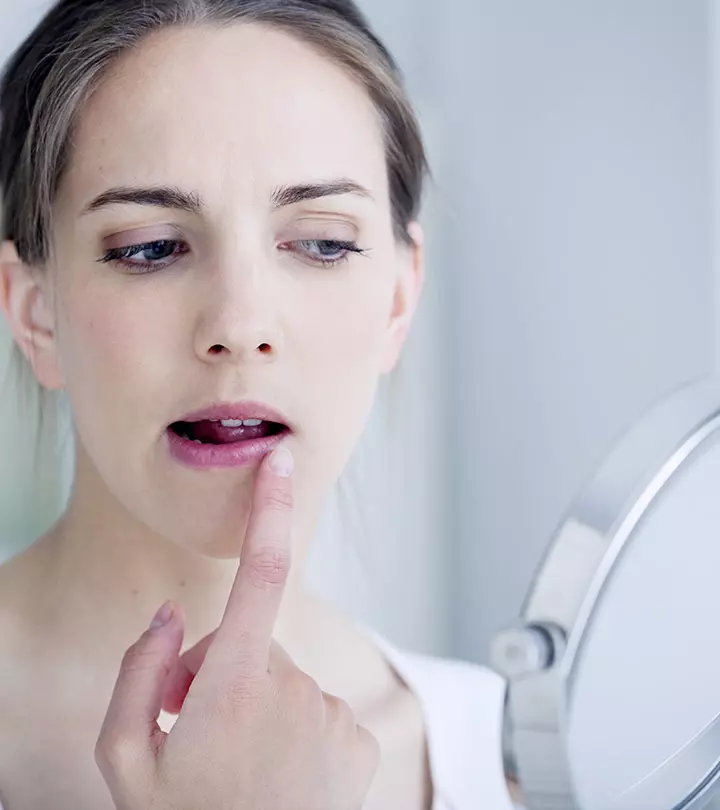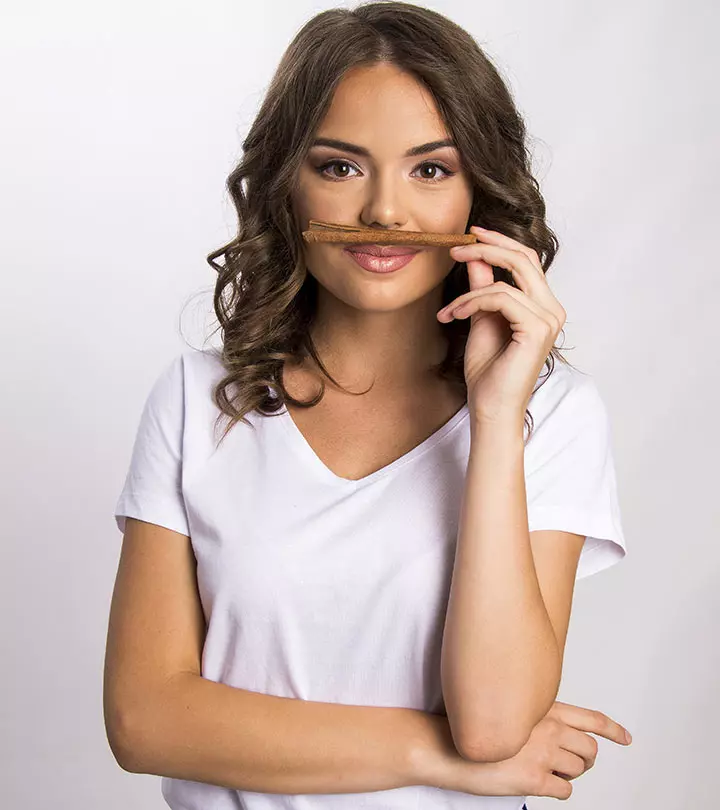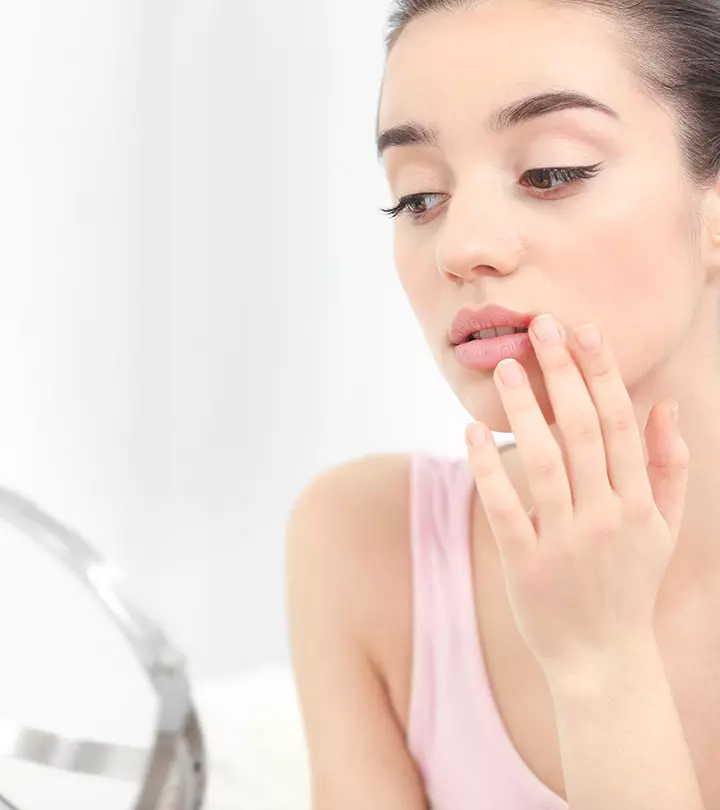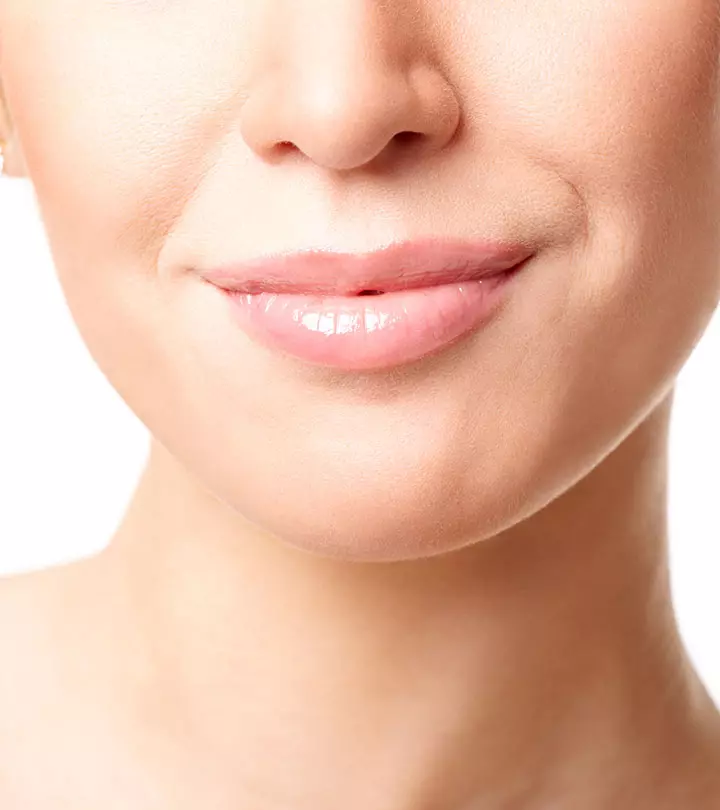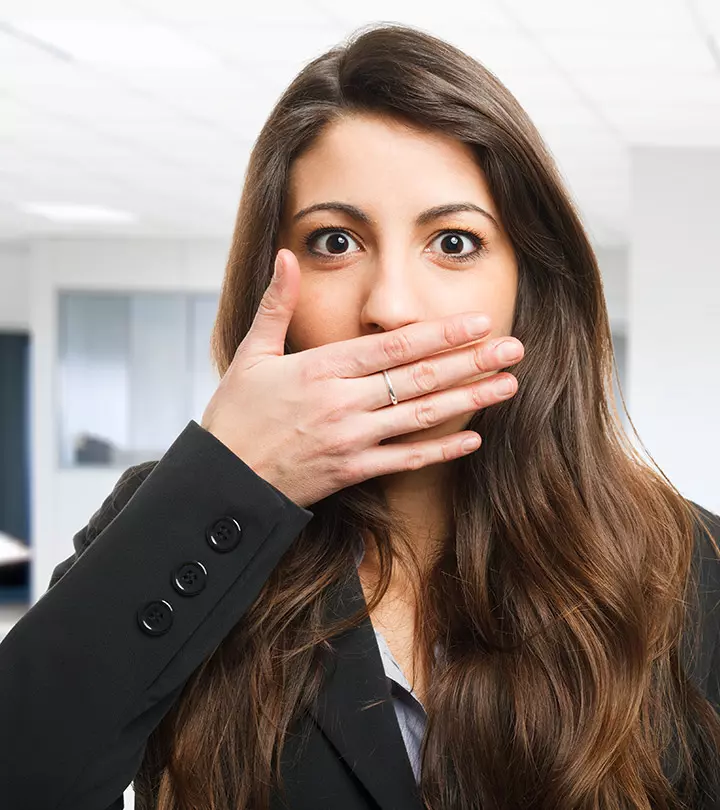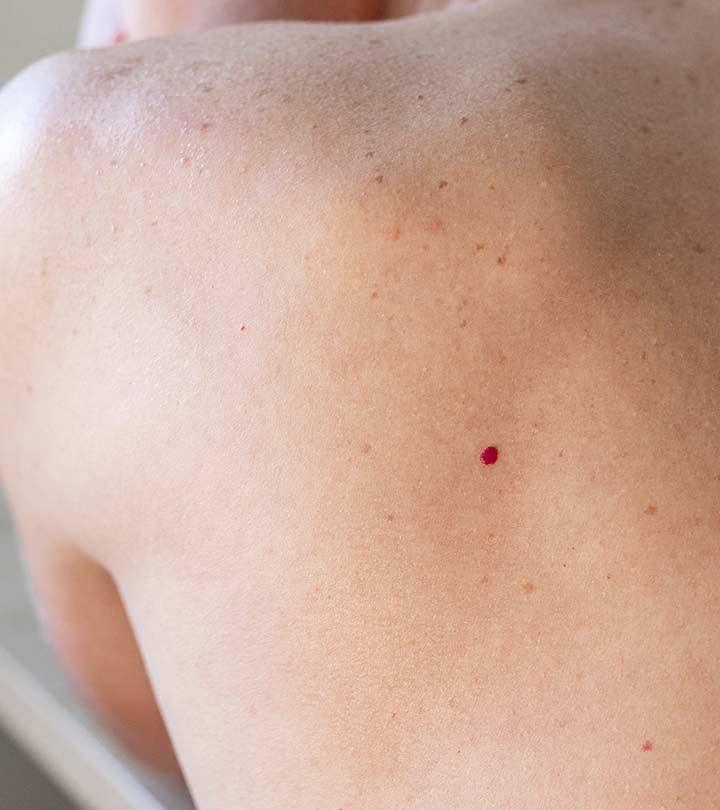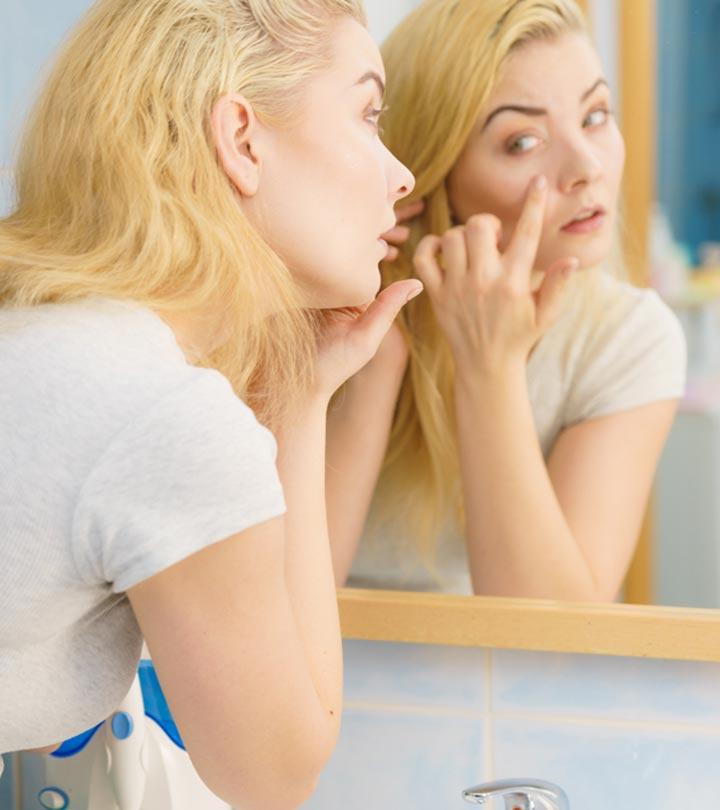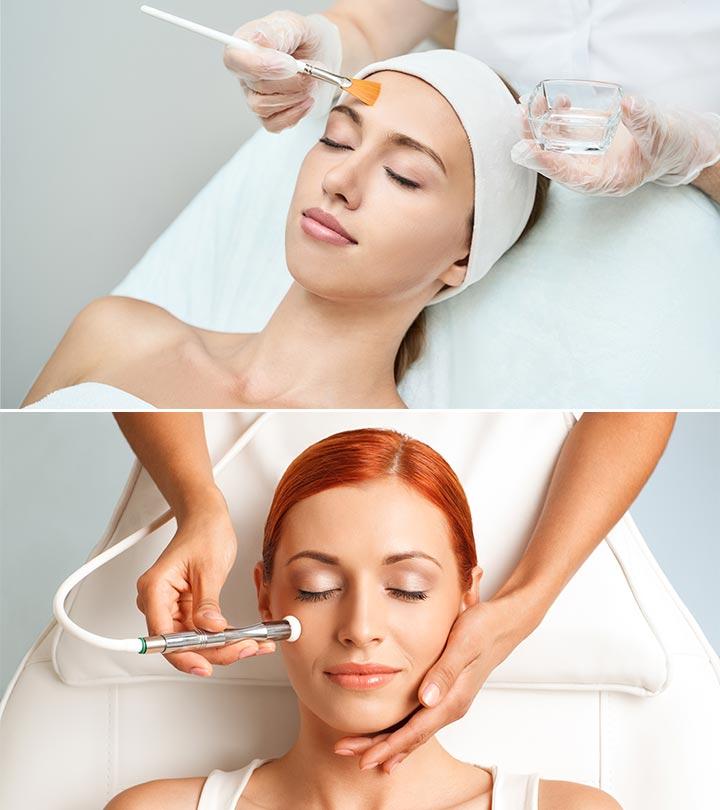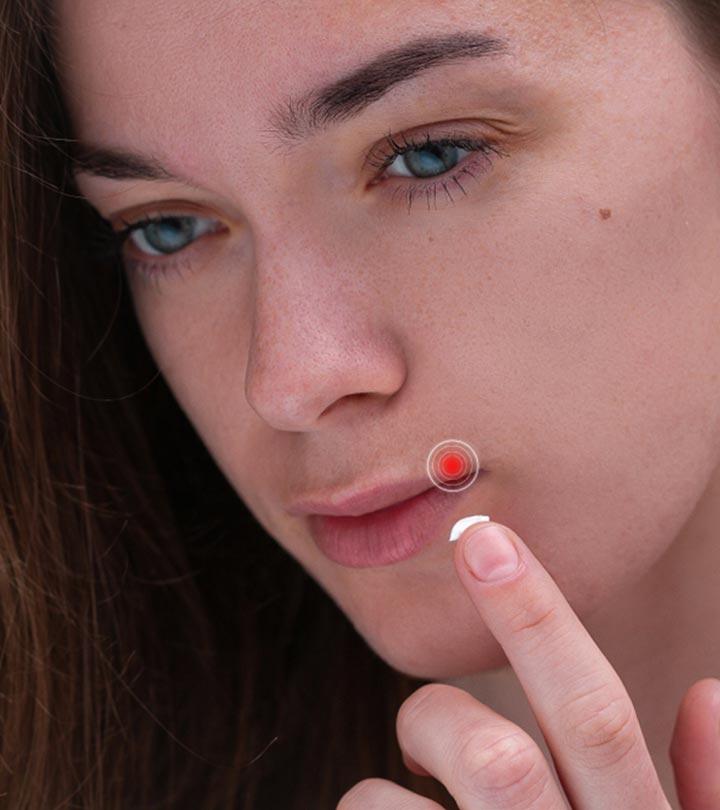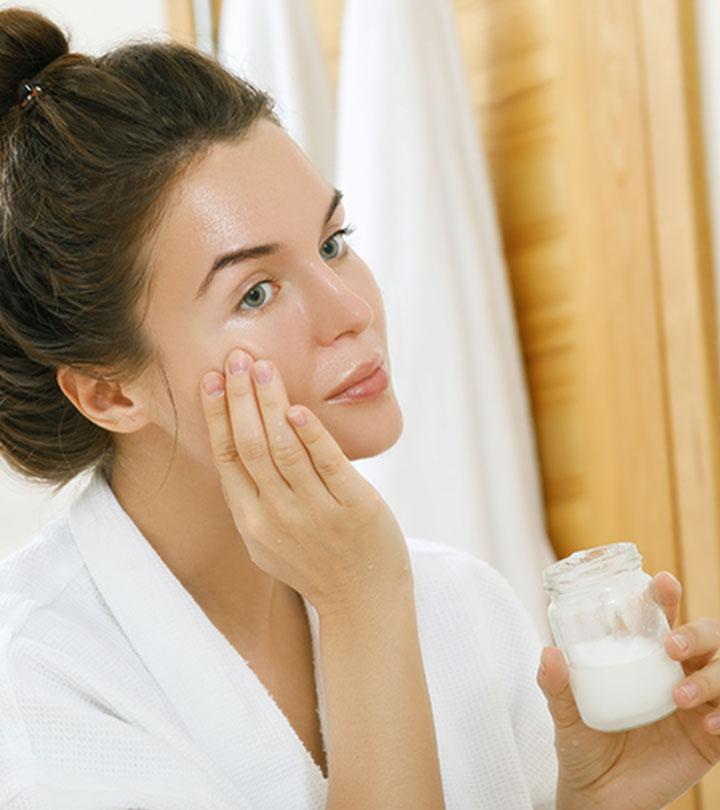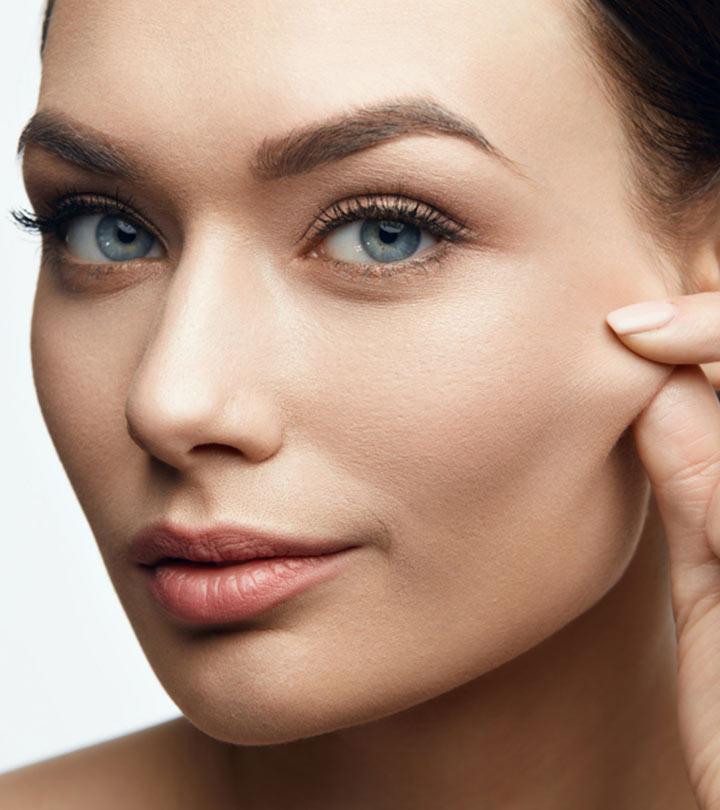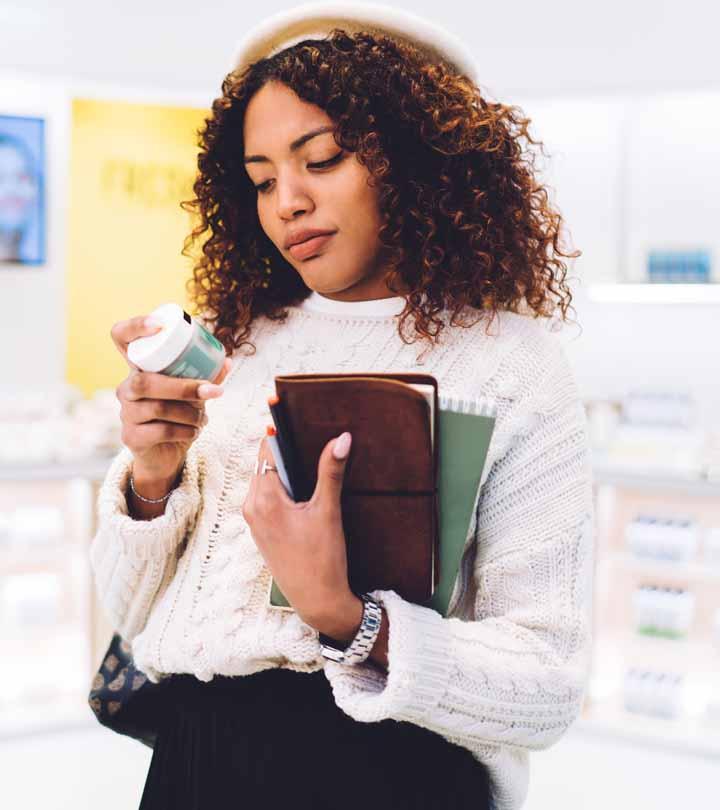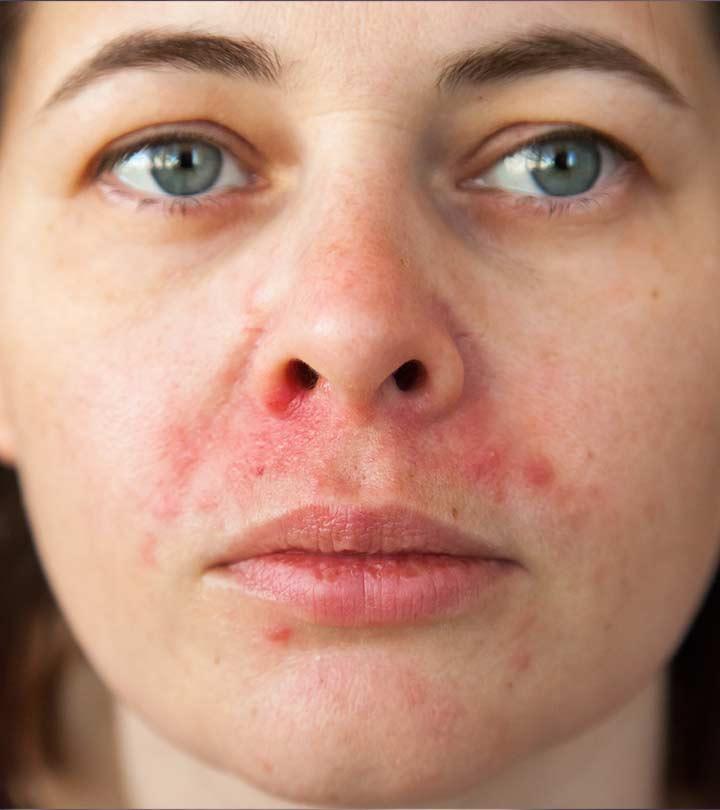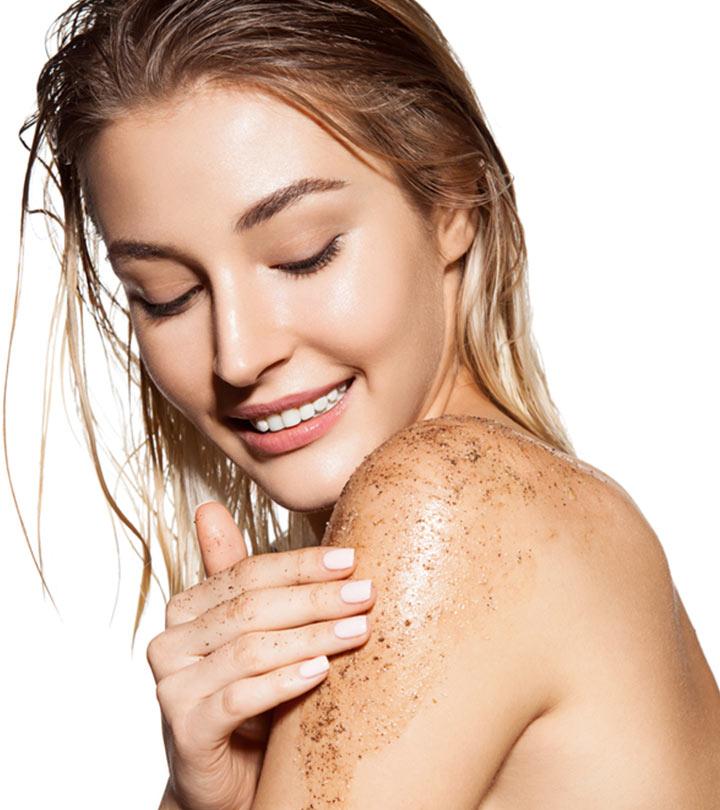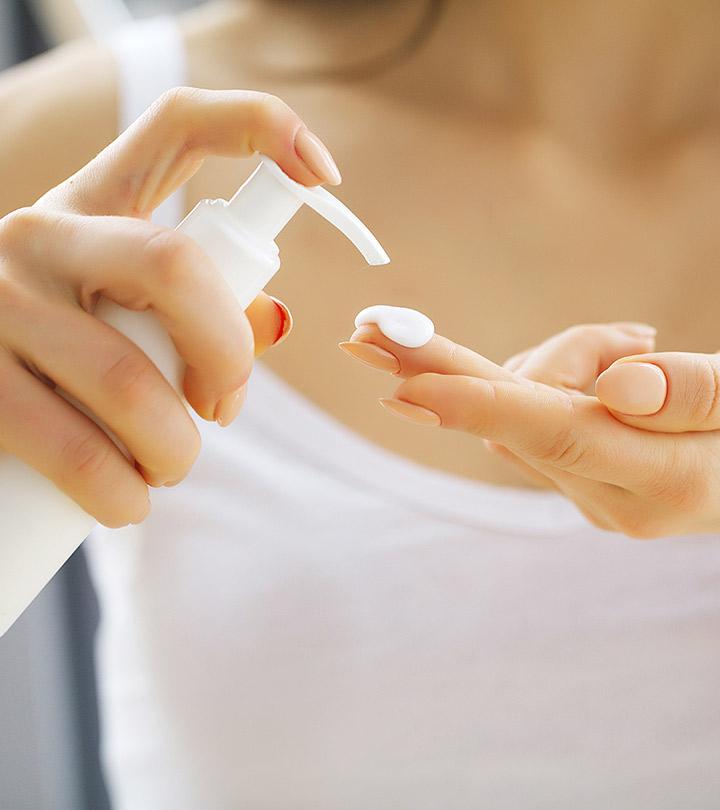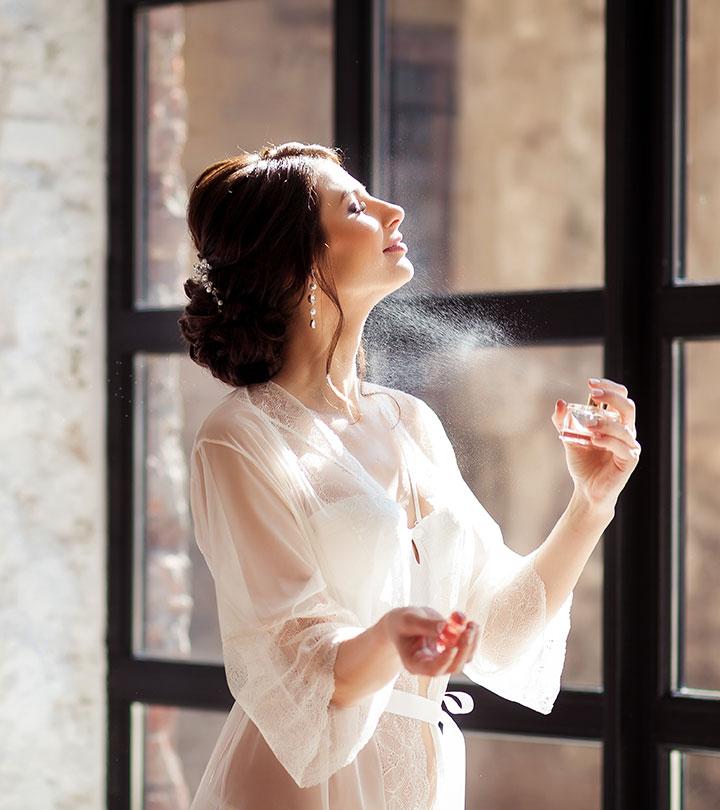Is Vaseline Good For Your Lips?
Believe it or not, there is a right way to nourish your lips with this essential product!
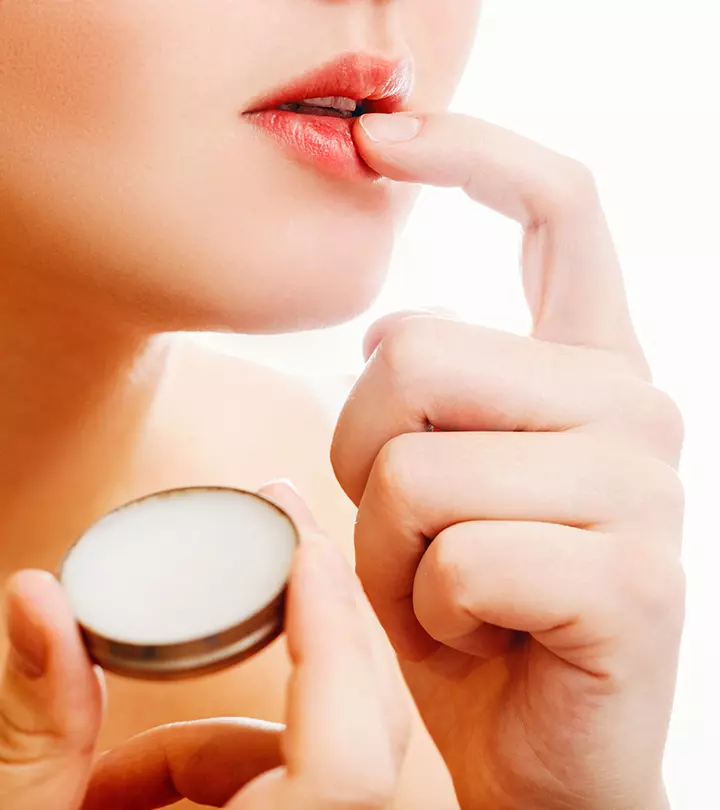
Image: Shutterstock
During the cold winter months, dried, chapped, and cracked lips are a common concern for all. If you’ve wondered if you can put vaseline on your lips, you’re right, it can be your best bet when that happens as it works as a thick moisturizing agent that smooths your lips and eliminates dryness and chapping. Also, you are usually advised not to use products like lipsticks or glosses since they can worsen the problem. While Vaseline may be the most widely used lip balm, does it really work? Keep reading to learn more.
In This Article
Is Vaseline Good For Chapped Lips?
Vaseline is basically petroleum jelly, a type of occlusive moisturizer that helps lock the moisture in your skin (1). Unlike humectants that acquire water from the air, Vaseline works by forming a protective barrier on the lips to prevent moisture loss. This means that it does not add any moisture to your lips but seals in the existing moisture, making ti an effective lip therapy product. Therefore, if your lips are chapped and need moisture, applying Vaseline first will not do you much good since there is not enough moisture for it to lock in (2).
Vaseline is good for lips. It is a safe and gentle way to retain moisture in your lips and keep them protected. It strengthens the skin barrier and helps deal with extreme dryness and irritation (3). You can include it in your daily skin care regimen and use it in combination with other moisturizing products to prevent your lips from chapping. It also improves lip nourishment. Additionally, it may even speed up lip healing.
Bianca, a blogger, shared her experience of using Vaseline to keep her lips healthy in her personal blog. She said, “ My lips instantly feel hydrated, moisturized, smooth and soft not only when applied but even after it wears off, my lips still feel nourished (i).”
Dr. Anna Chacon, MD, FAAD, says, “You may make your chapped lips worse if you only lick them before applying Vaseline, as lips don’t retain water very well.”
However, you must also remember that Vaseline is produced by a refining process that uses potentially harmful chemicals. Also, it is obtained from petroleum using a drilling technique that is harmful to the environment. It is a complicated product and needs thorough analysis before you decide to buy it.
Slathering Vaseline on your chapped lips is not a great way to use it. Learn the best way to use this chapped lip remedy in the next section.
How To Use Vaseline On Lips
When your lips dry out and turn flaky, you should avoid licking or picking the flaky skin. Here’s what you need to do to improve lip care:
- Exfoliate your lips to buff away the dead skin and flakes. You can make your own exfoliating scrub with sugar and natural lip emollients such as cocoa butter.
- Moisturize your lips with a soothing moisturizer or lip balm containing hyaluronic acid and ceramides to prevent irritation and further chapping. You can also use a natural moisturizer, such as shea butter, coconut oil, cocoa butter, etc., to moisturize dry lips.
- Finally, apply a coating of Vaseline to lock the moisture in and retain the softness and smoothness of your lips. It can be used as a lip conditioner or a lip salve.
Note: Do not exfoliate your lips daily. You can use a mild exfoliant to scrub away dirt, dead skin, and impurities from your lips 2 to 3 times a week.
 Trivia
TriviaWhile Vaseline is great for locking the moisture in your lips, you need to take some precautions as it can cause some side effects. Check them out below.
Side Effects Of Vaseline On Lips
Some side effects of Vaseline include:
- Adverse Reaction
Petroleum-based products may cause adverse reactions like redness and irritation if you have sensitive skin. Therefore, always perform a patch test on your arm before using Vaseline on your sensitive skin.
- Infection
Petroleum jelly may cause a fungal or bacterial infection if you don’t maintain proper hygiene before using it. Its sticky texture may trap fungi or bacteria that you then apply and spread around your lips. So, make sure that you keep your jar of Vaseline clean and in a hygienic place. Also, make sure that you wash your hands and cleanse and dry your lips properly before applying it to your chapped lips.
- Aspiration Pneumonia
Please consult your doctor before using Vaseline around the nose or the mouth area, especially for children. Accidentally inhaling Vaseline can lead to aspiration pneumonia (4).
- Clogged Pores
Vaseline is comedogenic, which means it can clog pores. When you use it on your lips, there are chances that the pores around your mouth can get clogged up and unclean over time. Therefore, cleanse your lips thoroughly before using Vaseline.There have been concerns regarding the potential carcinogenic effects of petroleum jelly, which are mostly related to its manufacturing process. However, Vaseline and other commercially available petroleum jelly are refined and purified to remove any carcinogenic material.
Now, let’s answer the question that is on everyone’s mind.
Is Vaseline Better Than Chapstick?
You can use a chapstick infused with sunscreen (SPF) on your lips to keep them hydrated and moisturized and then top up with Vaseline to prevent the moisture from escaping. The main differences between chapstick and Vaseline are:
- Chapsticks can be flavored and fragranced, whereas Vaseline is odorless, tasteless, and colorless.
- Vaseline contains petroleum jelly with a bit of scent to lock in the moisture, whereas chapsticks are made with moisture-infusing ingredients that help in healing dry lips.
- Chapsticks are only made for lips, whereas Vaseline can also be used on other body parts (like knees and elbows) to get rid of dryness.
So, should you use chapstick or Vaseline for lip maintenance? Both! Chapstick moisturizes dry lips, and Vaseline helps in sealing the moisture in and keeping the skin barrier intact. While you can get away with using just chapstick, there is no point in using Vaseline without applying chapstick first.
 Fun Fact
Fun FactChapped lips can be annoying and even painful. Learn how to prevent your lips from chapping in the next section.
How To Prevent Chapped Lips
Some of the things you can do to prevent chapped lips are:
- Do not breathe from your mouth. Mouth breathing emits warm air over your lips that can lead to dryness and chapping.
- Do not keep licking your lips when they are dry. People find it almost irresistible, but your saliva can worsen the dryness and leave your lips even more chapped and flaky.
- Avoid touching your lips repeatedly when they are dry and chapped. This can transfer germs onto their surface and cause an infection.
- Drink plenty of water to keep your body, skin, and lips hydrated.
- During winters, use a humidifier in your room to maintain optimum humidity. Lack of moisture in the air causes skin dryness due to trans-epidermal water loss.
- Stay away from lip products like lip softeners or lip ointments that contain artificial dyes and fragrances as they can lead to dryness and allergic reactions. Also, products containing preservatives and harsh substances like sulfates and parabens are best avoided as they strip away the natural oils from your lips and leave them dehydrated.
- Use a lip moisturizer or balm with SPF since excessive sun exposure can also cause dryness.
- Ingredients such as menthol, cinnamon, salicylic acid, and alcohol can irritate the skin and make it dry and flaky. Avoid them in your lip products.
- Exfoliation is the key. It helps eliminate dirt and impurities to smoothen the skin.
Besides following these tips, you can also avoid certain ingredients that can dry out your lips and use others that can heal them. Check them out below.
Ingredients To Avoid That May Dry Out Your Lips
According to the American Academy of Dermatology, these are some of the worst offenders on the list (5):
- Menthol
- Eucalyptus
- Artificial flavors and fragrances
- Camphor
- Lanolin
- Octinoxate or oxybenzone
- Propyl gallate
- Phenol
- Salicylic acid
Ingredients That Can Heal Dry Lips
These are some of the best ingredients to combat lip dryness (5):
- Ceramides
- Mineral oils
- Castor oil
- Shea butter
- Petroleum
- Cocoa butter
- Zinc oxide and titanium oxide
- White petroleum jelly
- Dimethicone
- Hemp seed oil
Infographic: Does Vaseline Work Well For The Lips?
Do you also find yourself worrying about dry, chapped, and cracked lips during the winter months? Well, your ideal solution probably is Vaseline, which can smoothen your lips and reduce dryness and chapping. But how good is Vaseline really for lips? Does it have any side effects? To learn more, consider checking out the infographic below. Illustration: StyleCraze Design Team
Using Vaseline for lips is not new. People have been using it for years to prevent cracked and chapped lips during the winter season. However, applying Vaseline first will not do any good to your lips as it only helps lock in the existing moisture. To prevent chapping, you may have to use it with other moisturizing products like a lip balm, chapstick, or lip mask. You can follow the steps discussed in the article to know the best way to use Vaseline on your lips.
Frequently Asked Questions
Is it okay to keep Vaseline on my lips overnight?
Yes. Keeping Vaseline on the lips overnight will moisturize and soften them.
Can Vaseline make lips pink?
Massaging the lips with Vaseline may promote blood circulation, making your lips naturally pink
Can I use Vaseline on my lips every day?
You may apply Vaseline on your lips daily to lock in the natural moisture and prevent dryness. You can also apply it as a lipstick base. However, avoid doing so if you are allergic to the product.
Does vaseline darken lips?
There is no scientific evidence to suggest that Vaseline can darken lips. It does not contain any ingredients that are known to cause pigmentation or discoloration of the lips. However, using Vaseline on your lips regularly can keep them hydrated and soft.
Key Takeaways
- Vaseline or petroleum jelly is a great way to seal the moisture in your lips.
- It strengthens the skin barrier and prevents moisture from escaping, keeping your lips soft and smooth.
- Redness, irritation, clogged pores, and infection may be some of the side effects of using vaseline.
- A combination of both flavored chapsticks and vaseline will moisturize your dry lips, lock the moisture in, and give you gentle and soft lips.
Experience the wonders of Vaseline for your lips. Watch this video to uncover how it can keep your lips soft, smooth, and nourished.
Personal Experience: Source
StyleCraze's articles are interwoven with authentic personal narratives that provide depth and resonance to our content. Below are the sources of the personal accounts referenced in this article.
i. Vaseline Lip Therapyhttps://aobmblog.wordpress.com/2019/06/13/vaseline-lip-therapy/
References
Articles on StyleCraze are backed by verified information from peer-reviewed and academic research papers, reputed organizations, research institutions, and medical associations to ensure accuracy and relevance. Read our editorial policy to learn more.
- Moisturizers: The Slippery Road
https://www.ncbi.nlm.nih.gov/pmc/articles/PMC4885180/ - Clinical Assessment of a Combination Lip Treatment to Restore Moisturization and Fullness
https://www.ncbi.nlm.nih.gov/pmc/articles/PMC2923945/ - Significance of Skin Barrier Dysfunction in Atopic Dermatitis
https://www.ncbi.nlm.nih.gov/pmc/articles/PMC5911439/ - Exogenous Lipoid Pneumonia
https://secure.jbs.elsevierhealth.com/action/getSharedSiteSession?redirect=https%3A%2F%2Fjournal.chestnet.org%2Farticle%2FS0012-3692%2820%2933603-5%2Ffulltext&rc=0 - Dermatologists’ Tips For Healing Dry, Chapped Lips
https://www.aad.org/public/everyday-care/skin-care-basics/dry/heal-dry-chapped-lips
Read full bio of Dr. CP Thajudheen
- Dr. Anna Chacon, MD, FAAD, is a double board-certified dermatologist with over 7 years of experience. She has authored many peer-reviewed articles and managed clinical research studies during her fellowship. She completed her medical school in the PLME (Program of Liberal Medical Education) at Brown University.
 Dr. Anna Chacon, MD, FAAD, is a double board-certified dermatologist with over 7 years of experience. She has authored many peer-reviewed articles and managed clinical research studies during her fellowship. She completed her medical school in the PLME (Program of Liberal Medical Education) at Brown University.
Dr. Anna Chacon, MD, FAAD, is a double board-certified dermatologist with over 7 years of experience. She has authored many peer-reviewed articles and managed clinical research studies during her fellowship. She completed her medical school in the PLME (Program of Liberal Medical Education) at Brown University.
Read full bio of Ramona Sinha
Read full bio of Monomita Chakraborty





